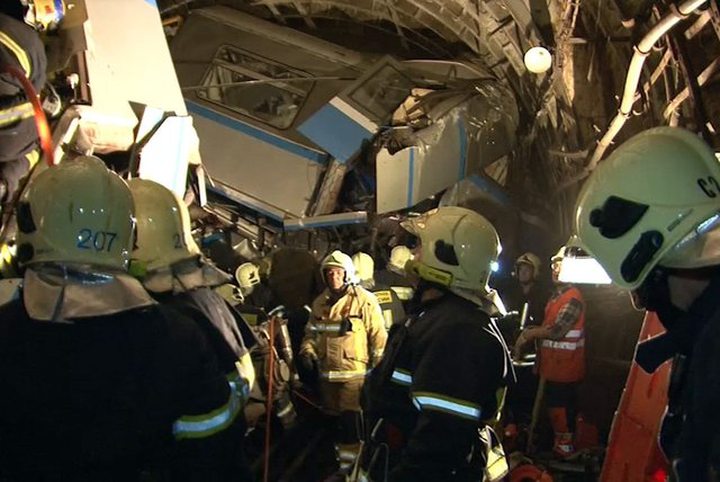At Least 21 Dead in Moscow Subway Crash

A subway train derailed in Moscow during the morning rush hour on Tuesday, killing at least 21 people and injuring more than 150, officials said, in one of the deadliest incidents ever on the city's metro.
According to a preliminary investigation, three cars derailed in a tunnel in the western part of the city. Hundreds of people were trapped, and it took rescue workers several hours to take them out of the crushed cars, officials said.
Health Minister Veronika Skvortsova said 12 people died in the tunnel, seven more died after being moved to train stations, and two more people died in a hospital. Emergency ministry officials said one person remains trapped in a crushed train car in the tunnel. It isn't clear how many of the wounded are in grave condition.
It isn't clear what caused the accident. The emergency ministry said an electricity outage caused a problem, resulting in an abrupt braking of the train, which crashed into the walls of the tunnel. However, the city electricity company said it hasn't registered any loss of power.
The Investigative Committee, Russia's primary federal investigative authority, opened a probe of the incident on suspicion of transport safety violations.
The committee said its investigators were on the scene.Vladimir Markin, a spokesman for the committee, blamed the accident on a "technical catastrophe" and excluded a terrorist attack. He said the train derailed at a speed of about 43 miles an hour.
"We had a tragic event occur today in the metro. An accident occurred and people died," Russian Prime Minister Dmitry Medvedev said, the Interfax news agency reported. He ordered the Russian government to help the city of Moscow clean up and care for the injured.
State TV showed pictures of destroyed cars in the tunnel and rescuers carrying wounded on stretchers through the marbled hall of a station. Service on the part of the subway system's east-west blue line, which runs under the center of Moscow, was suspended.
Alexander Zagnibeda, a brewing company manager who was on the metro at the time, posted photos on his Facebook page showing his exit through the muddy tunnels after the incident. He wrote that he flew from the center of his subway car to its far end in the crash and climbed out a window amid the smell of burning and scorched cables.
"There were so many corpses…people who had lost consciousness," Mr. Zagnibeda wrote on his Facebook page. He described shouting and panic as the subway car was crushed. "It's horrible," he said. He didn't respond immediately to a request to comment.
Gulnara Penkova, a spokeswoman for Moscow Mayor Sergei Sobyanin, told Interfax that the mayor's office would compensate families of those killed with about one million rubles ($29,100) and pay those who suffered injuries about 500,000 rubles. She said the Moscow metro would provide additional insurance money of about two million rubles to the families of those killed and as much as one million rubles to passengers who were injured, depending on the seriousness of their wounds. Mr. Sobyanin vowed to fire and bring to justice those responsible for the accident. Moscow's subway network is a backbone of the city's transport system. About 10,000 trains run through the system's 12 lines and 194 stations, carrying as many as nine million passengers a day, making it one of the globe's largest metros.
It is one of the most famous and extravagant in the world and a top tourist attraction in the Russian capital. It was built under Soviet leader Joseph Stalin in the 1930s and conceived as an underground heaven for the proletariat—with chandeliers, marble arches and grand statues—at a time when many Moscow families were forced to share apartments because of a housing shortage.
Fatal accidents and delays are rare on one of the Russian capital's best-functioning institutions. A number of terrorist attacks occurred on the metro, however, including major bombings by Chechen extremists in 2004 and 2010 that left dozens dead and hundreds wounded.
The number of minor accidents appears to have risen lately, with loss of power, smoke or signaling problems occurring almost monthly in the past year.





